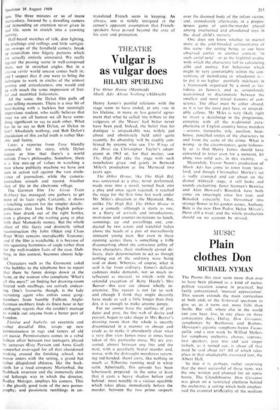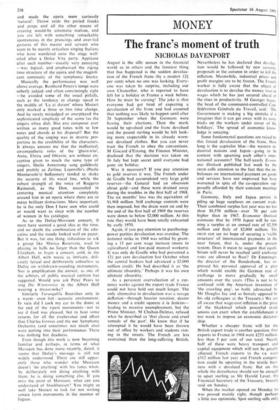MUSIC
Plain clothes Don
MICHAEL NYMAN
The Proms this year seem more than ever to have been planned as a kind of metro- politan vacation course in practical, but fairly conventional, 'musical appreciation'. This season extends the main curriculum at both ends of the historical spectrum to give us. as it turns out, more frills than thrills. But still, where else in the world can you hear, live, in one place on three consecutive days, Dufay, Don Giovanni. symphonies by Beethoven and Brahms. Messiaen's gigantic symphony-hymn Turan- galila, and a new work by Wilfrid Mclkrs for symphony orchestra, chorus, soprano, two speakers, jazz trio and scat singer (which, as it turned out, is about all that need be said about it)? All of which takes place in that unadaptable oversized tent, the Albert Hall.
So that it is. perhaps, rather surprising that the most successful of these items was the one written and planned for an opera house. The Glyndebourne Don Giovanni was given on a restricted platform behind the orchestra; a setting which both emphas- ised the essential artificiality of the medium
and made the opera seem curiously 'natural'. Throw aside the period frocks and props and all the other means of creating would-be cinematic realism, and you are left with something remarkably spontaneous in the prancings and over-fed gestures of this master and servant who seem to be merely articulate singing Italians who have wandered onto the stage well- oiled after a Dolce Vita party. Applause after each number—usually very annoying —was logical, and emphasised the zigzag time structure of the opera and the magnifi- cent continuity of the symphonic finales.
Musically the performance was well above average. Reinhard Peters's tempi were soberly judged and often convincingly right —he avoided some of the usual pitfalls, such as the tendency to change speed in the middle of 'La ci darem' where Mozart only marked a three to two time change. And he rarely misjudged or overplayed the sophisticated simplicity of the score (as the singers often did). Has any composer ever written so many good tunes with so few notes and chords at his disposal? But the quality of the singing was in inverse pro- portion to the credibility of the characters. It always amazes me that the ineffectual, unsympathetic roles of the `ghost-trio', Anna, Elvira and Ottavio, are without ex- ception given to much the same type of singers. Sheila Armstrong sang guilelessly and prettily as Zerlina; Leporello's (Paolo Montarsolo's) buffoonery tended to shake the security of his vocal line, while the robust strength of the voice of Ruggero Raimondi, as the Don, succeeded in centering musical attention completely around him in an opera where there are so many brilliant distractions. More important, he is the only Don I have seen who could or would want to. sleep with the number of women in his catalogue.
As to the Dufay-Messiaen concert, it must have seemed a good idea at the time, and no doubt the combination of the edu- cative and the trendy looked well on paper. But it was, for one thing, ridiculous to ask a group like Musica Reservata, used to playing in halls no larger than the Queen Elizabeth, to begin a concert, cold, in the Albert Hall, with music as intricate, deli- cately lyrical and deliberately colourless as Dufay on withdrawn-sounding instruments. Nor is amplification the answer, as one of the arbiters of public musical opinion has suggested. Would you ask Peter Pears to sing Die Winterreise in the Albert Hall wearing a throat-mike?
Similarly Turangalila flourishes only in a warm—even hot—acoustic environment. In vain did I cock my ear to the dome at the end of the ripest movements—not to see if God was pleased, but to hear some returns for all the exuberance and effort that Charles Groves and the BBC Symphony Orchestra (and sometimes not much else) were putting into their performance. There was nothing but deadness.
Even though this work is now becoming familiar and perhaps, in terms of what Messiaen has done more recently, dated, it seems that Dufay's message is still not widely understood. There are still appar- ently those who wonder why Messiaen doesn't 'do anything' with his tunes when, by deliberately not doing anything with them, he is doing something else. If you miss the point of Messiaen, what can you understand of Stockhausen? You might as well take Mozart to task for not writing sonata form movements in the manner of fugues.



































 Previous page
Previous page